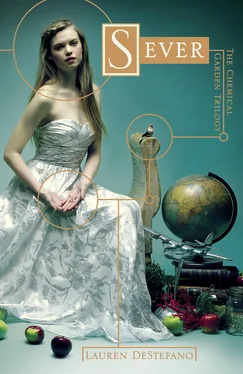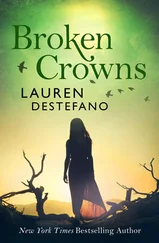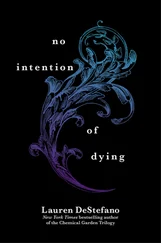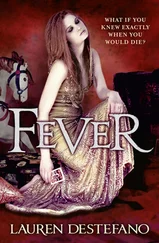I wrap my arm around her shoulders, and she leans against me.
“Vaughn is dangerous,” I say into her ear. “Linden doesn’t want to believe it, but I think you do.”
“I know,” she says.
“He’s tracking your every move the way he tracked me.”
“I know.”
“He killed Jenna.”
“I know. I know that.”
“Don’t let Linden talk you into trusting him,” I say. “Don’t put yourself in a situation where you’re alone with him.”
“You can run away, but I can’t,” she says. “That’s my home. It’s all I have.”
Linden clears his throat in the doorway. Cecily bounds to him and ups herself on tiptoes to kiss him when she takes the brownie from his hand. Then she unwraps its plastic. She settles in a chair and props her swollen feet up on the window ledge. She has a way of ignoring Linden’s hints about wanting to be alone with me. It was a minor annoyance in our marriage, but right now it’s a relief. I don’t know what Linden wants to say to me, only that his fidgeting means he wants it to be in private, and I’m dreading it.
I watch as Cecily nibbles the edges of the brownie and dusts crumbs off her shirtfront. She’s aware of Linden’s restlessness, but she also knows he won’t ask her to leave. Because she’s pregnant, and because she’s the only wife left who so genuinely adores him.
Linden picks up the sketchbook he abandoned on a chair, sits, and tries to busy himself looking through his building designs. I sort of feel sorry for him. He has never been authoritative enough to ask for what he wants. Even though I know this conversation he’s itching to have will leave me feeling guilty and miserable, I owe him this much.
“Cecily,” I say.
“Mm?” she says, and crumbs fall from her lips.
“Leave us alone for a few minutes.”
She glances at Linden, who looks at her and doesn’t object, and then back to me.
“Fine,” she sighs. “I have to pee anyway.”
After she leaves, closing the door behind her, Linden shuts his notebook. “Thanks,” he says.
I push myself upright, smooth the sheets over my thighs, and nod, avoiding his eyes. “What is it?” I ask.
“They’re letting you out tomorrow,” he says, taking the seat by my bed. “Do you have any sort of plan?”
“I was never good at plans,” I say. “But I’ll figure it out.”
“How will you find your brother?” he says. “Rhode Island is hundreds of miles away.”
“One thousand three hundred miles,” I say. “Roughly. I’ve been reading up on it.”
He frowns. “You’re still recovering,” he says. “You should rest for a few days.”
“I might as well get moving.” I close the atlas. “I have nowhere else to go.”
“You know that isn’t true,” he says. “You have a—” He hesitates. “A place to stay.”
He was going to say “home.”
I don’t answer, and the silence is filled with all the things Linden wants to say. Phantom words, ghosts that haunt the pieces of dust swimming in beams of light.
“Or,” he starts up again. “There is another option. My uncle.”
That gets me to look at him, maybe too inquisitively, because he seems amused. “My father disowned him years ago, when I was very young,” he says. “I’m supposed to pretend he doesn’t exist, but he doesn’t live far from here.”
“He’s your father’s brother?” I say, skeptical.
“Just think about it,” Linden says. “He’s a little strange, but Rose liked him.” He says that last part with a laugh, and his cheeks light up with pink, and I strangely feel better.
“She met him?” I ask.
“Just once,” Linden says. “We were on our way to a party, and she leaned over the driver’s seat and said, ‘I’m sick of these boring things. Take us anywhere else.’ So I gave the driver my uncle’s address, and we spent the evening there, eating the worst coffee crumb cake we’d ever tasted.”
It’s the first time since her death that he’s brought up Rose without wincing at the pain.
“And the fact that my father hates him just made my uncle that much more appealing to her,” Linden goes on. “He’s too pro-naturalism for my father’s taste, and admittedly a little strange. I’ve had to keep it a secret that I visit with him.”
Linden has a rebellious side. Who knew. He reaches out and tucks my hair behind my ear. It’s done out of habit, and he jerks his hand back when he realizes his mistake.
“Sorry,” he mumbles.
“It’s all right,” I say. “I’ll think about it.” My words are coming out fast, bumbling. “What you said—I mean—I’ll think about it.”
CECILY HANGS out the limo’s open window, her hair flailing behind her like a ribbon caught on a hook. Bowen, in his father’s arms, reaches out to catch it. I’m astounded by how much he grew while I was away. He’s a teddy bear of a boy—stocky and friendly and apple-cheeked. He was born with dark hair and beaming blue eyes that have since gone hazel. His hair has lightened to a coppery blond that I imagine mimics Cecily’s when she was a baby, which we’ll never know for certain. He has her defiant chin, her thin eyelashes. With every day that passes, prominent traces of Linden dissolve from his face.
He is beautiful, though. And Cecily is mad for him. I’ve never seen anyone love anything as much as she loves that baby. Even now, though she’s facing the sky that rushes past, she’s singing a lullaby for him. I recognize it as a poem from a book in the library on the wives’ floor. Jenna used to read it aloud.
And frogs in the pools singing at night,
And wild plum-trees in tremulous white;
Robins will wear their feathery fire
Whistling their whims on a low fence-wire …
The sun is setting, making the world orange. I rub my fists over my knees, uneasy. I can’t believe Vaughn let us use the limo for this. Maybe he’s trying to stay on Linden’s good side, to manipulate him by being contrite and reliable. I keep expecting the driver to turn on us and take me back to the mansion. But he has taken us so far into the countryside that I’m beginning to let go of that fear. It’s been minutes since we passed any buildings. There’s only grass, and the occasional lone tree that comes and goes like an explosion.
Cecily interrupts her song to ask, “Where are we?” and lean back into her seat.
“Someplace rural,” Linden says. “It’s hard to say. I never knew the street names.”
Cecily reaches for the baby, and then holds him over her head, blowing absurd-sounding kisses on his belly; his giggles make her grin.
“It’s this turn,” Linden tells the driver. “Off the road. Follow the tire tracks.”
Even the limo, with its smooth ride, jostles over the uneven terrain. And a few minutes later we’ve come to the only thing in sight: a two-story brick house that looks as old and stable as the mansion, but much smaller. Surrounding it are half a dozen tarps arranged like black car-shaped ghosts. There’s a dilapidated shed and a windmill. The roof is covered in reflective panels.
Cecily crinkles her nose and turns to Linden. “We can’t leave her here,” she says. “It looks like a junkyard.”
“It’s not as bad as all that,” he says.
“There’s tinfoil on his roof!”
“They’re solar panels,” Linden amends patiently. “So he doesn’t have to use so much electricity.”
Cecily opens her mouth to object, but I say, “It’s only for a couple of days. It looks fine.” I don’t mention that, while this is a step down from the luxuries of the mansion, it’s as nice as any of the homes I grew up near. And solar panels aren’t uncommon in Manhattan at all, where many can’t afford electricity.
Читать дальше












